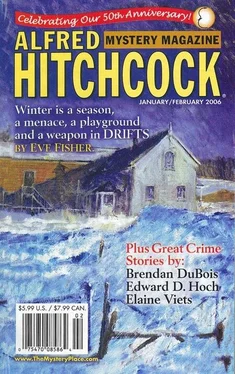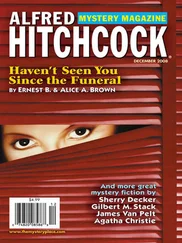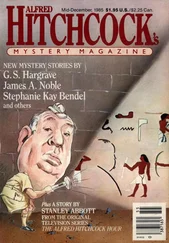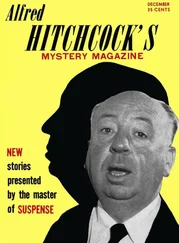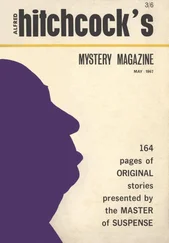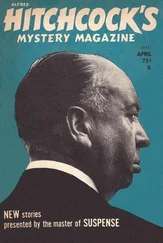John Betancourt - Alfred Hitchcock’s Mystery Magazine. Vol. 51, No. 1 & 2, January/February 2006
Здесь есть возможность читать онлайн «John Betancourt - Alfred Hitchcock’s Mystery Magazine. Vol. 51, No. 1 & 2, January/February 2006» весь текст электронной книги совершенно бесплатно (целиком полную версию без сокращений). В некоторых случаях можно слушать аудио, скачать через торрент в формате fb2 и присутствует краткое содержание. Город: New York, Год выпуска: 2006, Издательство: Dell Magazines/Crosstown Publications, Жанр: Детектив, на английском языке. Описание произведения, (предисловие) а так же отзывы посетителей доступны на портале библиотеки ЛибКат.
- Название:Alfred Hitchcock’s Mystery Magazine. Vol. 51, No. 1 & 2, January/February 2006
- Автор:
- Издательство:Dell Magazines/Crosstown Publications
- Жанр:
- Год:2006
- Город:New York
- ISBN:нет данных
- Рейтинг книги:4 / 5. Голосов: 1
-
Избранное:Добавить в избранное
- Отзывы:
-
Ваша оценка:
- 80
- 1
- 2
- 3
- 4
- 5
Alfred Hitchcock’s Mystery Magazine. Vol. 51, No. 1 & 2, January/February 2006: краткое содержание, описание и аннотация
Предлагаем к чтению аннотацию, описание, краткое содержание или предисловие (зависит от того, что написал сам автор книги «Alfred Hitchcock’s Mystery Magazine. Vol. 51, No. 1 & 2, January/February 2006»). Если вы не нашли необходимую информацию о книге — напишите в комментариях, мы постараемся отыскать её.
Alfred Hitchcock’s Mystery Magazine. Vol. 51, No. 1 & 2, January/February 2006 — читать онлайн бесплатно полную книгу (весь текст) целиком
Ниже представлен текст книги, разбитый по страницам. Система сохранения места последней прочитанной страницы, позволяет с удобством читать онлайн бесплатно книгу «Alfred Hitchcock’s Mystery Magazine. Vol. 51, No. 1 & 2, January/February 2006», без необходимости каждый раз заново искать на чём Вы остановились. Поставьте закладку, и сможете в любой момент перейти на страницу, на которой закончили чтение.
Интервал:
Закладка:
“Just coffee, thanks.”
“Cream and sugar?” she asked over her shoulder, already halfway to the serving stand in the corner where two coffeepots steamed gently on hot plates.
“No, thanks.”
Auburn sipped his coffee slowly and meditatively, dividing his attention between the shrinking crowd outside and the customers of the The Green Fish. The bar and grill may not have been the heart of the neighborhood, but it probably reflected the rhythm and flavor of local life as accurately as anyplace else.
Customers left, others came in. They all seemed to know what was going on across the street. And from the way the newcomers looked at him, Auburn sensed that they also knew, as if by telepathy, that he wasn’t an ordinary patron but a detective engaged in the investigation. From time to time one of them lingered by his table, ostensibly peering across the street through the plate glass window with the picture of the fish on it, but also taking the opportunity to give him the once-over at close quarters.
Most of them were obviously regulars, but Auburn suspected that a couple of the bar patrons had hiked the six blocks from the Greyhound bus station on Guinan Boulevard for quick nips during layovers. The regulars, nearly all of them men, didn’t look a prosperous lot. There were the usual neighborhood retirees, a few younger people possibly out of work for one reason or another, a couple of unclassifiables.
Scotty and Darla worked smoothly together, communicating in the quaint jargon of the hash slinger and taking turns serving drinks at the bar, collecting payments at the cash register, and feeding dirty dishes to the huge automatic dishwasher in the corner. The radio droned and twanged on, at times barely audible above the clatter of dishes and the mutter of voices.
Because the two streets out front dead-ended into each other, there was virtually no traffic. The only cars and trucks that ever moved into Auburn’s field of vision seemed to belong to patrons of The Green Fish. Over on the levee, he could see Dollinger and Krasnoy giving brief and no doubt suitably vague answers to the television reporter. Kestrel was going over the sidewalk inch by inch like a man who has lost a contact lens in the snow. Ida Blanford’s house stood solemn and empty, the front parlor ablaze with sunlight streaming in an east window.
Eventually Darla came back with more coffee.
“Do you live here in the neighborhood?”
“I used to live in the apartment upstairs.” She rested the coffeepot on the table, leaned closer, and lowered her voice. “After Scotty’s wife died he moved out of their place on Eversole, kicked me out, and moved in here himself. I’ve got an apartment now at the other end of the Randolph Street Bridge.”
“Are you here every day?”
“Six days. We’re closed Sundays. I work till eight, when the dining room closes.”
“Has there been any kind of trouble in the neighborhood recently?”
“Like what kind of trouble?”
“Break-ins, vandalism, gangs, drugs...?”
“Highmore’s Grocery right over on the other corner closed up about three months ago. They said it was because they didn’t have enough business, but Scotty and I think it’s because they had two holdups in a row around Christmas time.” She picked up the coffeepot.
“Did you know Ms. Blanford?” Auburn asked her.
She put the coffeepot down again. “Not to talk to. I saw her outside almost every day. She used to drive a big old Lincoln to go shopping and to go to church on Sundays, but we heard she totaled it and lost her driver’s license because they said she was legally blind. Since Highmore’s closed, you’d see her coming back from the bus stop with shopping bags maybe a couple days a week.”
“Have you noticed anything unusual going on over at her place in the past few days?”
“No. Sometimes a younger man stops in the afternoon, usually on weekends. Sometimes he comes in a truck and other times he brings his family in a car — wife and two little boys. But I haven’t seen them over there in the last month or two. I always figured they were family.”
“Could I get your name, miss?”
She glanced down to make sure her name tag was showing. “Darlece Fontaine.” She spelled both names.
Contrary to his usual procedure, Auburn didn’t ask for an exact address and he didn’t start a file card until she had gone away to serve other customers, and then he made only the sketchiest of notes.
A ten-year-old boy put his head in through the family entrance and called “Paper!” A man on one of the barstools asked if he had the world soccer scores.
Across the way, Dollinger and Krasnoy took off in their cruiser, probably on a call. A few minutes later an ancient hearse stopped in the street outside with a screech of brakes, and two mortuary attendants disappeared over the brow of the levee with a body bag and a folding stretcher. After a lengthy interval they reappeared, loaded the remains of Ida Blanford into the hearse, and drove off with a squeal of rubber.
The TV crew, having captured that bit of history on tape, went their way. Some time later Stamaty and Kestrel left the scene also. At the house next to Ida Blanford’s, a woman in a housecoat was shaking a dustmop into the breeze while her dog ran sniffing around the front yard. A pale, frail man with a cane was promenading slowly up and down the sidewalk in the late morning sun. Auburn sat on behind the grimy window with the painted green fish.
It wasn’t the standard way to conduct a homicide investigation. He should have been leafing through Ida Blanford’s private papers in search of suspicious associations, requesting a background probe on her and her nephew from Records, canvassing the neighborhood to learn if anyone had heard a shot, checking on recent holdups, muggings, and similar crimes in the district — in particular, the two holdups at the grocery across the street. Instead, he sat here soaking up the atmosphere of the bar and grill — the smell of cooking varied by an occasional whiff of liquor, the babel of voices, the jangling of music.
At a few minutes before eleven he went to the men’s room and called headquarters on his cell phone. His immediate superior, Lieutenant Savage, had received a radio report from Dollinger and Krasnoy, who had questioned neighbors up and down the block without finding anyone who had heard a shot the night before or observed anything unusual in the vicinity of Ida Blanford’s house. Savage had ordered a background probe on the victim and was talking to Fire and Rescue about having the river dragged for the weapon.
“I don’t know if you remember it,” he said, “but they found the gun that killed Stan Karlowski on the bottom of the river about a quarter of a mile from where you are right now.”
“I remember. It looks like the killer tried to toss her body in the river. I wouldn’t be surprised if he tossed the gun in too.”
Auburn indicated somewhat vaguely that he’d be at the scene for a while yet. He didn’t mention that he was hanging out in a bar and grill.
On his way back to his table in the window he was intercepted by Scotty Casteven, who was sipping a soft drink in the back corner of the bar during a lull in activity. Auburn wondered if Casteven had just overheard his half of the phone conversation.
“What does it look like, Officer?” he asked. “A stickup, or just some psychopath?”
“We’re still checking. There wasn’t any cash in her purse. You saw the bullet hole.”
A glass-fronted cabinet next to the side entrance was crammed with every imaginable kind of green fish — figurines in china, wood, plaster, and plastic, coffee mugs, bottle openers, key-chain guards, a small pillow, a large light bulb, a electrified singing rubber bass mounted on a plaque.
Читать дальшеИнтервал:
Закладка:
Похожие книги на «Alfred Hitchcock’s Mystery Magazine. Vol. 51, No. 1 & 2, January/February 2006»
Представляем Вашему вниманию похожие книги на «Alfred Hitchcock’s Mystery Magazine. Vol. 51, No. 1 & 2, January/February 2006» списком для выбора. Мы отобрали схожую по названию и смыслу литературу в надежде предоставить читателям больше вариантов отыскать новые, интересные, ещё непрочитанные произведения.
Обсуждение, отзывы о книге «Alfred Hitchcock’s Mystery Magazine. Vol. 51, No. 1 & 2, January/February 2006» и просто собственные мнения читателей. Оставьте ваши комментарии, напишите, что Вы думаете о произведении, его смысле или главных героях. Укажите что конкретно понравилось, а что нет, и почему Вы так считаете.
